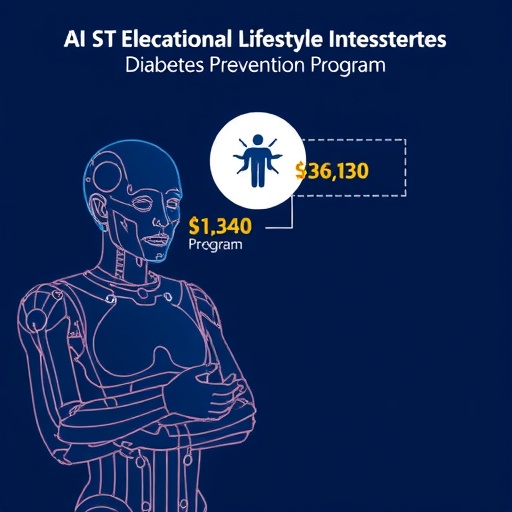In a groundbreaking study recently published in JAMA, researchers have unveiled compelling evidence on the effectiveness of fully automated Artificial Intelligence (AI)-led Diabetes Prevention Programs (DPP) compared to traditional human-led interventions. This research explores an emerging paradigm in managing prediabetes among adults dealing with overweight or obesity, challenging the conventional methods previously held as gold standards in diabetes prevention strategies.
The core of the study focused on a composite outcome, meticulously detailing parameters including weight reduction, physical activity levels, and glycated hemoglobin (HbA1c) measurements. Significantly, it was determined that AI-led programs were noninferior to their human-led counterparts in achieving these crucial health outcomes. The results illuminate the remarkable capabilities of technology in health interventions and suggest that widespread scaling of AI-driven programs may soon be both necessary and feasible.
The implications of these findings are profound. The sedentary lifestyle and unhealthy dietary patterns prevalent today have contributed to alarming rates of prediabetes and diabetes across various demographics, particularly among adults classified as overweight or obese. With healthcare systems continuously overburdened, AI intervention could streamline treatment access and effectiveness, ultimately mitigating the impending diabetes epidemic.
The research utilized a robust design, initializing a randomized trial involving a diverse group of participants. Randomization was employed to eliminate bias, enabling the team to draw actionable conclusions regarding the effectiveness of AI compared to human-led interventions. Participants in both groups underwent a rigorous 12-month program, designed not only to educate them about diabetes but also to guide them toward sustainable lifestyle modifications and enhanced physical activity.
Weight reduction was a primary focus of this clinical inquiry. Many studies have established a strong correlation between substantial weight loss and a lower risk of developing type 2 diabetes. Participants in both groups displayed significant reductions in weight, with measurable results apparent as early as six months. This aspect of the study showcases how an AI-led program can construct individualized health regimens, adapting in real time to the needs of the participants.
Physical activity was another pivotal element assessed in the study. Regular physical exercise is a cornerstone of diabetes prevention and is essential in improving metabolic health. The AI platform utilized in this study employed sophisticated algorithms to craft personalized workout plans and activity suggestions based on daily behavioral data collected from participants. Remarkably, feedback indicated that many individuals found themselves more motivated and engaged with an AI program, likely due to the instantaneous feedback and support it provided.
HbA1c, a key biomarker for diabetes management, was also meticulously monitored throughout the study’s duration. Both groups exhibited noteworthy reductions in HbA1c levels, affirming that automated interventions can deliver health benefits comparable to human-led programs. This aspect of managing diabetes marks a critical intersection of technology and human health, where real-time data can help predict and improve patient outcomes.
The success of AI-led programs prompts an examination of scalability and affordability in healthcare delivery. As healthcare costs continue to escalate, the AI model offers a potential solution that could democratize access to essential services, particularly for underserved populations. Automated programs might lead to more consistent participation rates, as users could engage privately and flexibly without the barriers posed by traditional in-person sessions.
Furthermore, embracing such technological advancements can foster innovation in the medical field, inspiring further research into AI applications across various health disciplines. The possibility of promoting broader health initiatives through automated programs might elucidate pathways to tackle other chronic diseases prevalent in society.
Ethical considerations surrounding AI and health interventions remain paramount. The study acknowledges potential concerns regarding data privacy, algorithmic bias, and the physicians’ role in patient care. Ensuring that AI programs supplement rather than overshadow the invaluable human touch will be crucial as we reconcile the benefits and limitations of technology in health.
As we look forward to an era characterized by technological integration in healthcare, the findings of this research are a harbinger of the potential transformations awaiting the medical landscape. This movement towards AI-led health interventions, especially for chronic disease prevention, represents a profound shift in how we think about patient care and wellness.
Nestoras Mathioudakis, the lead author of the study, eloquently stated that this advancement aims to empower individuals battling with prediabetes and obesity to take charge of their health using innovative tools that modern technology offers. The encouraging findings point toward a future where health strategies will be tailored to fit individual needs through advanced AI systems, promising better health outcomes for millions.
With this study, we stand on the brink of a new frontier in diabetes prevention. The emerging evidence indicates the efficacy of AI-led DPPs stands not only as an alternative but, in some cases, may even surpass traditional methods in engaging and retaining participants. As the world embraces these changes, the trajectory of preventing diabetes may shift significantly, fostering healthier lives through technology-driven initiatives.
Subject of Research: Efficacy of AI-led Diabetes Prevention Programs compared to human-led interventions.
Article Title: Noninferiority of Automated AI-Led Diabetes Prevention Programs in Adults with Prediabetes.
News Publication Date: TBD.
Web References: N/A.
References: N/A.
Image Credits: N/A.
Keywords
Diabetes, Artificial Intelligence, Physical Activity, Weight Loss, Prediabetes, Obesity, Human Health, Disease Prevention.




